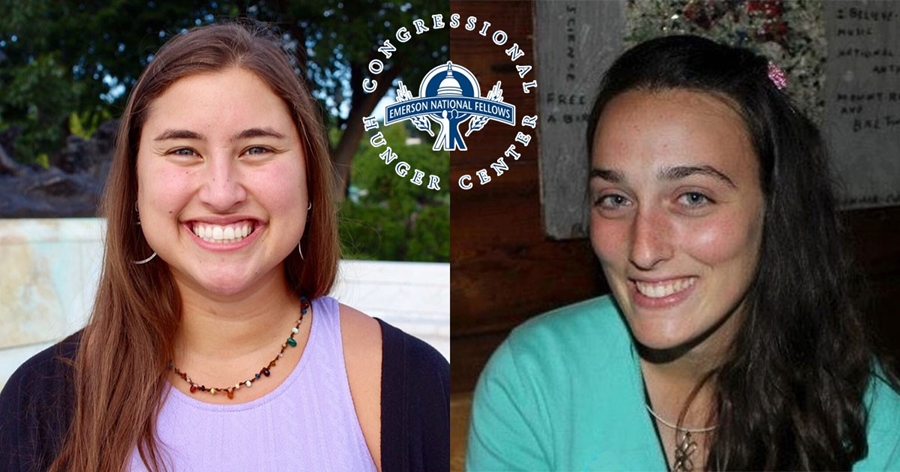FAYETTEVILLE, Ark. — The University of Arkansas School of Law’s Indigenous Food and Agriculture Initiative is hosting two Emerson National Hunger Fellows from the Congressional Hunger Center in Washington, D.C.
The center selected the initiative as a host site due to its focus on tribal policy reform, including regional food policy discussions at tribal communities across the United States and development of a model food code for use by tribal governments. This will be the first time the center has placed fellows in Arkansas.
The Congressional Hunger Center works to make issues of hunger a priority to policymakers in the United States government and to raise a new generation of leaders to address issues of hunger and poverty. Its mission is to train and inspire leaders who work to end hunger and to bridge the gap between grassroots efforts and national and international public policy to provide access to nutritious, affordable and culturally appropriate food.
“We are honored and delighted to host the visiting Hunger Fellows from this nationally prestigious program,” said Janie Hipp, director of the initiative. “Hunger is persistent within tribal communities throughout the United States with over 25 percent of all Native peoples relying daily upon federal feeding programs to address the health impacts of hunger and food insecurity.”
In some communities, the prevalence of food insecurity can rise to well over 50 percent. The initiative seeks to turn the corner on this humanitarian crisis through strong tribal and federal policies, integrated self-determination and self-governance and a deeper understanding of the connections between policies, resources, actions and outcomes.
“The Fellows we are working with will help us and others to better understand this landscape,” Hipp said.
The 2018 visiting fellows are Sarah Goldman from West Hartford, Connecticut, and Corey Malone-Smolla from Richmond, Virginia.
Goldman is founder of the Heart of the Heartland Program, a five-week summer program for undergraduate students that combines hands-on practical training with a policy, biology and business management curriculum. While at the initiative, she will convene roundtable discussions that will foster important intertribal discussion and collaboration so that tribes may come together to address national food policy while meeting their community needs around food, agriculture and nutrition.
“I’m drawn to the organization’s mission and relentless work toward allowing tribal governments to be the active agents in food systems change in Indian Country,” Goldman said. “I hope that — through my time at IFAI — I am able to become a reliable facilitator, advocate and source of information as I conduct policy roundtable discussions.”
Malone-Smolla developed her passion for food access as Yale University’s director of food recovery, where she coordinated the daily collection of leftover food from Yale’s dining halls to be delivered to soup kitchens in the New Haven area. Her fellowship will support the Model Comprehensive Food and Agriculture Code Project, which will create a model legal code for food and agriculture, hunger, nutrition, health and economic development. This model, along with an implementation process, will be shared with all tribes within the U.S. to aid development of localized economic strategies and food policy interventions.
“I hope to learn from everyone at the initiative the best ways to collaborate with individuals and communities across movements and justice initiatives.” Malone-Smolla said. “I see my work as aligning with the initiative's goal of increasing involvement in disciplines relating to food and agriculture. I know that this opportunity will affirm and direct my desire to work for food justice for all.”
Learn more about the fellowship and the Congressional Hunger Center at www.hungercenter.org.
About the Congressional Hunger Center: Established in 1993, the center’s mission is to train and inspire leaders who work to end hunger and advocate public policies that create a food secure world. The staff and fellows are committed to fulfilling the goal of the former House Select Committee on Hunger, “to find real solutions to hunger and poverty.” It administers the Bill Emerson National Hunger Fellows Program and the Mickey Leland International Hunger Fellows Program.
About the Indigenous Food and Agriculture Initiative: The initiative enhances health and wellness in tribal communities by advancing healthy food systems, diversified economic development and cultural food traditions in Indian Country. The initiative empowers tribal governments, farmers, ranchers and food businesses by providing strategic planning and technical assistance; by creating new academic and professional education programs in food systems and agriculture; and by increasing student enrollment in land grant universities in food and agricultural related disciplines.
About University of Arkansas School of Law: The University of Arkansas School of Law prepares students for success through a challenging curriculum taught by nationally recognized faculty, unique service opportunities and a close-knit community that puts students first. With alumni in all 50 states, the District of Columbia, two territories and 20 countries, it has been ranked among the top 10 "Values in Legal Education" by the National Jurist magazine for four consecutive years and is among the top 42 public law schools, according to U.S. News and World Report.
About the University of Arkansas: The University of Arkansas provides an internationally competitive education for undergraduate and graduate students in more than 200 academic programs. The university contributes new knowledge, economic development, basic and applied research, and creative activity while also providing service to academic and professional disciplines. The Carnegie Foundation classifies the University of Arkansas among only 2 percent of universities in America that have the highest level of research activity. U.S. News & World Report ranks the University of Arkansas among its top American public research universities. Founded in 1871, the University of Arkansas comprises 10 colleges and schools and maintains a low student-to-faculty ratio that promotes personal attention and close mentoring.
Topics
Contacts
Janie Simms Hipp, director (Chickasaw)
Indigenous Food and Agriculture Initiative
479-575-4699,
Bryan Pollard, communications director (Cherokee)
Indigenous Food and Agriculture Initiative
918-457-9117,
